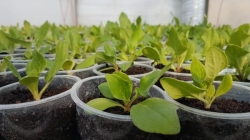The pandemic did not stop the scientific research in UPT
The first results of a cross-border environmental project
The COVID-19 pandemic restricted circulation and forced the passage of many traditional activities in the virtual environment, but did not stop scientific research and interest in scientific and educational progress. An example of this is the NETMIN cross-border project, which aims to decontaminate soils polluted with heavy metals due to mining activities. The project, launched in the fall of 2019 by Politehnica University Timișoara and the Bor Mining and Metallurgy Institute (Serbia) is now showing its first results.
The project, which also aims at "forming the network to increase environmental protection measures in the field of pollution due to mining in cross-border areas", acronym NETMIN, eMS no. RORS-308, implemented within the Romania-Serbia Interreg-IPA Cross-Border Cooperation Program, continued in the laboratory phase during the two months of social distancing.
As a result of the mining activities, tailings dumps remain in large areas, and in the underground environment, the waters that cross the existing mine galleries come to the surface. Heavy metals are thus present in all environmental factors in this area and significantly affect local ecosystems and human health.
The project team took soil samples from several areas of Banat, where mining activities took place and is looking for the best phytoremediation methods for soils polluted with heavy metals. At the proposal of prof. dr. Radu Șumălan, Ph.D., from the University of Agricultural Sciences and Veterinary Medicine "King Mihai I" of Banat in Timisoara two bioindicator plants - barley and cup plant - were tested. The soil samples taken were placed in growing pots together with the bioindicator plants. Biometric measurements were performed during growing. At the end of the growing season, the plants were separated and dried at room temperature. The dried plants were separated into root and stem and then burnt. Soil and ash samples were mineralized, determining the heavy metal content by atomic absorption spectrometry. Two successive cultivations were carried out.
The absorption of various heavy metals, from the soil solution or through the root, is selective for most cultivated plant species. The accumulation of heavy metals in plants depends mainly on their concentration in the soil solution, on the interactions between these elements and last but not least on their physiological role. To establish the characteristics of the bioremediation process, the variation of the heavy metals content in the plant was observed, following the accumulation process. Plants grown on polluted land are not suitable for human or animal consumption but can be used industrially.
Professor Șumălan emphasizes that “Clean and healthy soils are indispensable for life in general, for food production, maintaining the health of the population and biodiversity. They reduce our vulnerability to climate change, drought, and floods. Although the general perception is that the soil is an abundant resource, it must be emphasized that this resource is not renewable (1 cm of soil is formed in about 100 years, in favorable conditions specific to the temperate climate). "
In turn, dr. Daniel Duda-Seiman, "Victor Babeș" University of Medicine and Pharmacy in Timișoara, a project expert warns that the healthy environment involves a complex of factors: "As early as 400 BC, Hippocrates published a list of some aspects that should be included in a correct medical evaluation, including the characteristics of the soil where the patient lives, as an essential influence on the state of health. However, it was only at the beginning of the twentieth century that the idea of the influence of soil on health was accepted. Plants absorb many elements from the soil, with important roles in their evolution ".
"We compare our results with those obtained from our project colleagues in Bor, Serbia and together we will propose to local authorities ways to implement phytoremediation of the soil in active mining areas or where mining has stopped, for better soil quality management ”- says assoc. prof. Cornelia Muntean, Ph.D. from Politehnica University Timișoara, director of the NETMIN project.
During the summer, workshops will continue in which project specialists will meet with representatives of local authorities and residents of mining areas in Romania and Serbia, to present the possibilities to combat soil pollution with heavy metals by cultivating plants that can be used later as a source of electricity production.





















